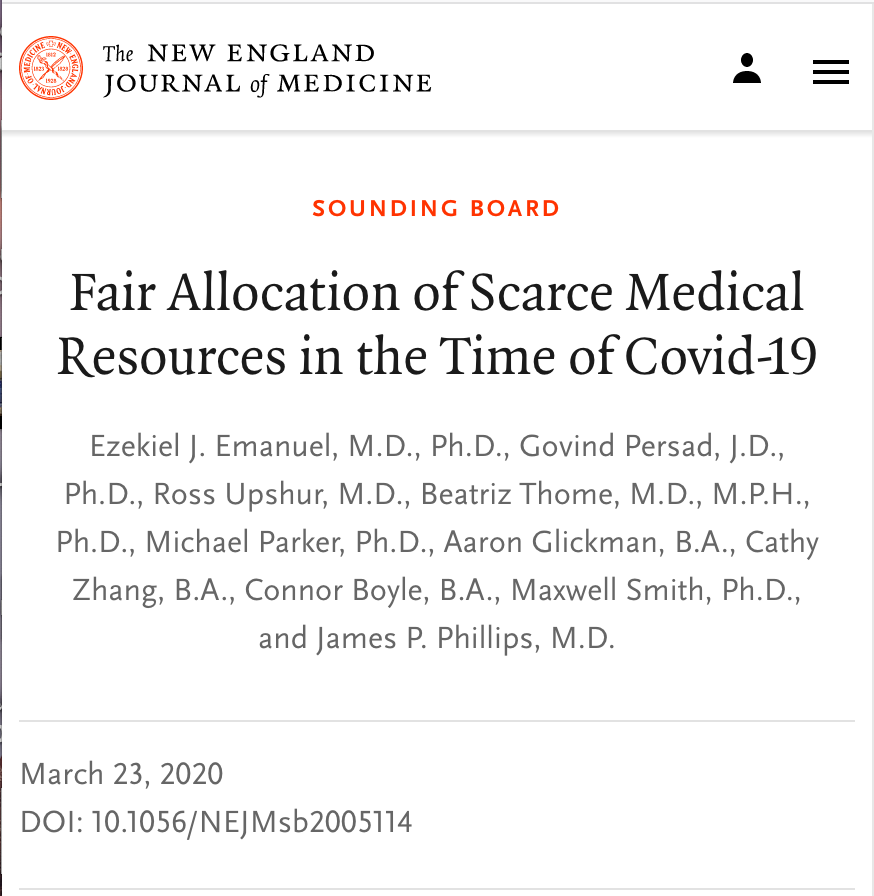Allowing society to preferentially kill disabled people by denying medical care on the basis of disability (through, eg ventilator rationing policies) will, ultimately, result in the loss of more "lives and more years of life" than other rationing mechanisms, eg a random lottery
The authors of "Fair Allocation of Scarce Medical Resources in the Time of Covid-19" in @NEJM lay out six "recommendations" for allocating "scarce medical resources" including ventilators in this piece...
https://www.nejm.org/doi/full/10.1056/NEJMsb2005114?query=recirc_curatedRelated_article">https://www.nejm.org/doi/full/...
https://www.nejm.org/doi/full/10.1056/NEJMsb2005114?query=recirc_curatedRelated_article">https://www.nejm.org/doi/full/...
In their 1st rec, the authors claim, "Priority for limited resources should aim both at saving the most lives and at maximizing improvements in individuals’ post-treatment length of life. Saving more lives and more years of life is a consensus value across expert reports."
As a practical matter, "maximizing improvements in individuals’ post-treatment length of life" means that chronically ill and disabled people who, by virtue of their disability have a shorter life expectancy than non-disabled people, are disadvantaged by this rationing principle
To put it another way, the authors suggest a scheme that disproportionately places the burden on disabled people (i.e. killing us) for the failures of society to prepare for a pandemic, to adequately resource public health, and to scope a medical system with surge capacity
As @sbagen noted in this conversation, disabled people have less political power than non-disabled people. We were, by and large, excluded from decisions determining the capacity and competence of public health and health care system response to COVID https://twitter.com/mattbc/status/1243593833901744128?s=20">https://twitter.com/mattbc/st...
If disabled people are preferentially killed (e.g. denied care through vent rationing policies) so as to protect non-disabled people (i.e. in accordance with the "saving more lives and more years of life" principle propounded by the authors of the @NEJM piece),
where protect is understood to mean "give non-disabled people access to scarce life-saving treatment by denying it to disabled people" then isn& #39;t it more likely that in the future the same systemic failures will be allowed to persist?
In other words, if disabled people (who have less political power) bear the burden (i.e. are preferentially killed), in order to spare non-disabled people (who have much more political power), isn& #39;t there much less incentive for non-disabled people to fix *gestures broadly* this?
If, by preferentially killing disabled people, there& #39;s less incentive to fund public health preparedness including early detection of emerging infectious diseases (and countermeasures!), to fully fund a global, competent EIS-like system, & to build a resilient healthcare system
with meaningful surge capacity, with meaningful stockpiles, and with the ability to do what, for example, South Korea did, then doesn& #39;t preferentially killing disabled people actually run counter to "saving more lives and more years of life"?
The next novel ID pandemic may not have an R0 under 3 and a case-fatality rate than can be held, by virtue of a competent response to under 1%.
Anyway, I should have written this up for a journal. Except my work is interdisciplinary (this argument, for example, requires an understanding of politics and power). And I don& #39;t have any time because I spend almost all of it trying to keep myself and my friends alive these days
But yes, I really do do bioethics. (I could even hang with G.A. in class.) I realize that none of us who aren& #39;t physicians count right now (though I disagree with it) – but the internal inconsistency in the authors& #39; @NEJM piece seems fairly obvious to me  https://abs.twimg.com/emoji/v2/... draggable="false" alt="🤷♂️" title="Man shrugging" aria-label="Emoji: Man shrugging">
https://abs.twimg.com/emoji/v2/... draggable="false" alt="🤷♂️" title="Man shrugging" aria-label="Emoji: Man shrugging">

 Read on Twitter
Read on Twitter


